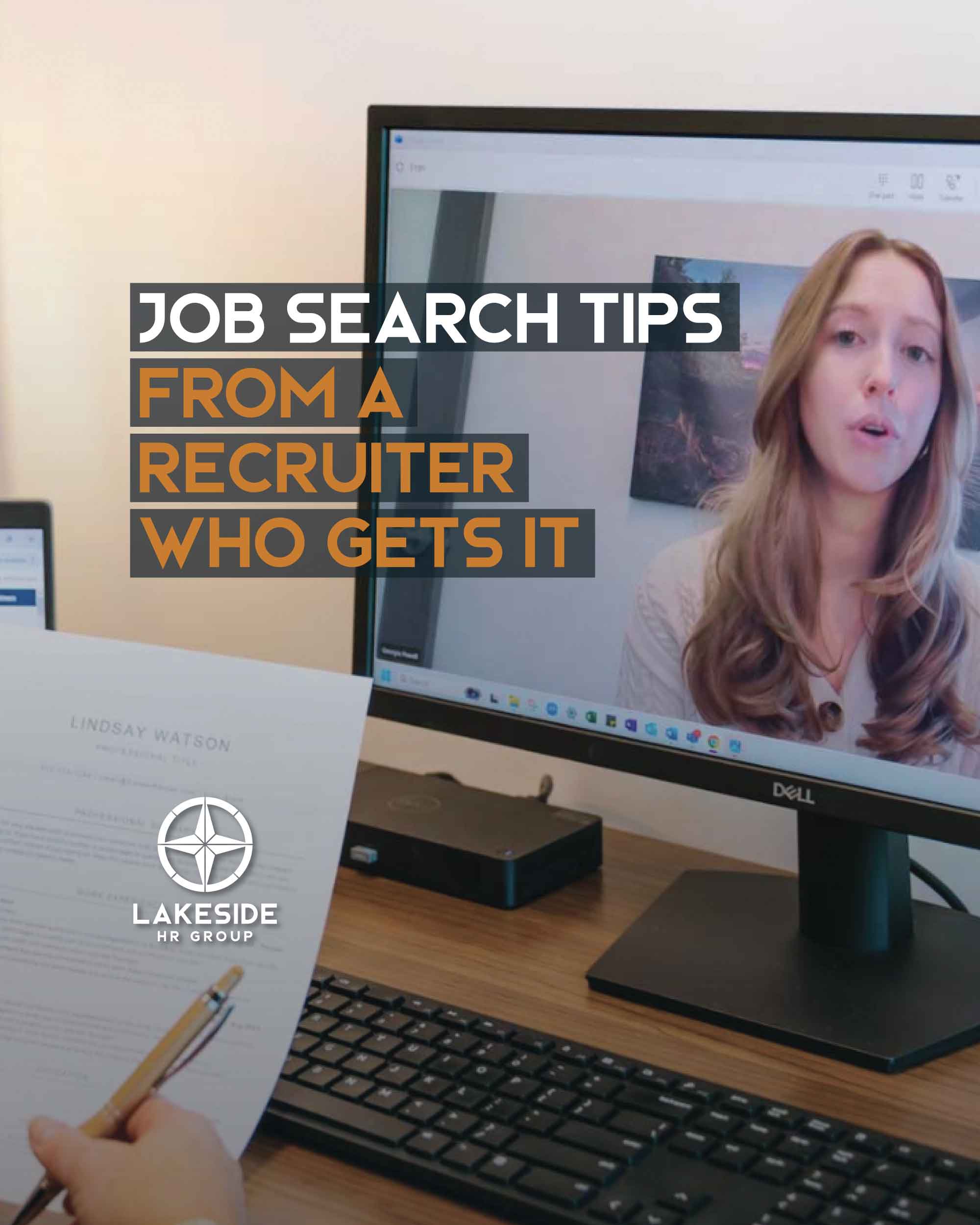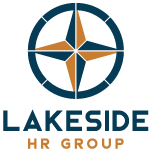Lately, we’ve been hearing from more and more job seekers who are feeling frustrated with the process. Whether it’s a lack of responses, an overwhelming amount of advice on LinkedIn, or simply trying to figure out where to start—it’s easy to feel stuck.
We asked one of our recruiters, Holly Trombley, to share her perspective. “I’ve been working in recruiting for the past three years,” Holly shares, “and while I won’t claim to be an expert, I’ve definitely learned a few things along the way.”
Holly has worked in both agency settings and as a fractional recruiter handling full-cycle talent acquisition for corporate clients. Her experience on both sides of the table gives her a unique view into what really works—and what doesn’t—when it comes to sharing practical job search tips.
Here are a few of Holly’s favorite, no-nonsense job search tips that she shares with candidates navigating the job hunt.

Job Search Tips: Keep Your Resume Simple and Authentic
Keep your resume simple.
“A clean, black-and-white resume is perfectly fine,” Holly says. “You don’t need fancy formatting, colors, or graphics to make it stand out.”
In fact, overly designed resumes can trip up applicant tracking systems (ATS) and prevent your application from ever being seen by a human. Her go-to recommendation? Submit your resume as a PDF, keep the formatting clean, and focus on clear, concise content.
Be careful not to overuse AI.
While AI can be helpful for brainstorming or refining content, Holly reminds job seekers to keep things authentic. “I get LinkedIn messages that are clearly written by AI. They’re too polished, too long—and honestly, they don’t feel real.”
Her advice? Use AI as a support tool, but not a replacement for your own voice. Keep your outreach short, personal, and genuinely you.
Use These or Similar Core Content Sections for Your Resume
Recruiters tend to agree on a set of core content sections that make a resume clear, concise, and effective—especially when it’s being reviewed quickly or filtered through an applicant tracking system (ATS). Here’s a recruiter-approved list of resume sections to include:
Contact Information
At the top of your resume, include:
- Full name
- Phone number
- Professional email address
- City and state (optional but often helpful for recruiters)
Professional Summary or Career Snapshot
A 2–3 sentence intro that highlights your experience, top skills, and the value you bring. This should be tailored to the type of role you’re applying for.
Example: Strategic HR leader with 10+ years of experience in talent development, employee engagement, and workforce planning in fast-paced environments.
Work Experience (Reverse Chronological)
For each role, include:
- Job title
- Company name + location
- Dates of employment
- 3–5 bullet points of day-to-day job duties
Core Competencies or Skills
Use a bullet-style or grid format to list key skills, tools, or certifications relevant to your target role.
This section helps with ATS keyword matching and skimmability.
Examples: Talent Acquisition • Change Management • ADP Workforce Now • Employee Relations • FMLA Compliance
Education
List:
- Degree(s) earned
- School name
- Graduation year (optional, especially for more experienced professionals)
Certifications or Licenses (if applicable)
Especially important for roles in HR, project management, finance, IT, etc.
Optional Sections (Include if Relevant)
- Volunteer Experience (especially if it’s leadership-related or skills-based)
- Professional Affiliations (e.g., SHRM, AMA, AIGA)
- Publications or Speaking Engagements
- Technical Skills (especially for IT, data, or marketing roles)
- Languages
Job Search Tips: Use your network—yes, your personal one too.
In addition to resume advice, many of Holly’s best job search tips involve leveraging your personal network—and yes, that includes friends and family.

“I think people often underestimate the power of their personal network,” Holly says. “Friends, family, former classmates, neighbors—these are people who want to help you.”
While LinkedIn is a great tool, Holly encourages job seekers not to overlook the people they already know. Sometimes the best introductions come from casual conversations within your existing circles. Here are some practical and authentic ways candidates can leverage their network:
Let People Know You’re Looking (Specifically)
Instead of a vague “I’m open to opportunities,” tell your network:
- The kind of role you’re looking for
- Your target industries or companie
- Your strengths or what you’re most excited to do
Example: “I’m exploring HR roles with a focus on employee engagement and internal communications—if you know of any growing teams, I’d love to connect.”
Set Up Informational Interviews
Reach out to former colleagues, classmates, or mentors and ask for a 20-minute chat to:
- Learn more about their role or company
- Ask about how they got where they are
- Get insight into industry trends or hiring patterns
It’s not about asking for a job—it’s about building relationships and staying top-of-mind.
Join (or Rejoin) Alumni Groups and Industry Associations
Many universities and professional groups have networking events, job boards, and mentoring programs.
- Attend meetups or virtual events
- Engage in online forums or Slack communities
- Reach out to fellow members for coffee chats
Ask for Referrals
If someone you know works at a company you admire, see if they’d be willing to refer you internally.
- Employee referrals often move your application to the top of the pile
- Most people are happy to help when asked respectfully and clearly
Post an Update on LinkedIn
Letting your extended network know you’re job searching—while being specific—can spark unexpected leads or offers to help.
Bonus tip: Thank those who engage with your post—commenting helps boost visibility and keeps the momentum going.
Reconnect with Past Managers, Coworkers, or Clients
Sometimes the best opportunities come from people who already know and trust your work.
- Reach out with a friendly note
- Ask if they’ve heard of any openings
- Offer to return the favor or help them in the future
Job Search Tips: Know the Role. Know Yourself. Show Up with Clarity and Confidence.
Do your research before the interview.
Preparing for an interview doesn’t just mean knowing the job description. “Look up the company, understand the role, and check out who’s interviewing you,” Holly suggests. “It always stands out when a candidate has looked at my LinkedIn or knows a little about my background.”
This kind of prep shows you care and makes the conversation more personal. If you find a shared connection or interest, even better—it’s a small detail that can make a big impact.
Be clear about what you want.
According to Holly, one of the most common hurdles in job searching is a lack of clarity. “I talk to a lot of candidates who say, ‘I’m open to anything,’ but that doesn’t help me help them.”
Whether you’re networking, interviewing, or filling out applications, being specific about your goals helps recruiters advocate for you more effectively. And it’s a good reminder that the job search goes both ways—you’re evaluating employers just as much as they’re evaluating you.
Being clear doesn’t mean you have to know everything—but having some direction helps you and everyone around you support your search more effectively. Here’s how to get there:
1. Identify Your Non-Negotiables
Start with what matters most to you:
- Desired salary range
- Work location or remote flexibility
- Industry or company size
- Values and culture fit
- Work-life balance needs
Example: “I’m looking for a remote role at a mission-driven company with a strong focus on DEI.”
2. Define the Type of Role You Want
Think about the job title or function you’re aiming for:
- Are you looking for leadership roles or individual contributor positions?
- Are you pivoting into a new field, or staying in your lane?
Example: “I’m targeting marketing manager roles at mid-sized tech companies.”
3. Know What You’re Good At (and Want to Keep Doing)
List out your strengths and the tasks that energize you:
- What projects have you loved working on?
- What do people often come to you for help with?
- What skills do you want to keep growing?
4. Consider What You’re Moving Away From
Sometimes knowing what you don’t want is just as important.
- Was your last job too siloed? Too fast-paced? Not strategic enough?
- Make note of those factors so you don’t repeat the pattern.
5. Write a Personal Positioning Statement
This is like your internal job-search compass. Try filling in the blanks:
“I’m looking for a [job title] role in [industry] where I can use my strengths in [skills/experience] to contribute to [goals or mission].”
Example: “I’m looking for a project management role in the healthcare space where I can use my strengths in cross-functional communication and process improvement to help teams work more efficiently.”
If you’re ready to stand out for the right reasons, check out our free on-demand webinar: “Shift Happens: How to Stand Out When Everything’s Changing”. This session is packed with tips on how to define your personal brand, refresh your professional presence, and stay confident in times of transition. Watch it now
Final Thoughts
“There’s no magic trick to landing a job,” Holly admits. “You can do everything ‘right’ and still not get the offer—and that’s hard. But the most important thing? Be yourself.”
We couldn’t agree more. The job search can be tough, but clarity, consistency, and authenticity go a long way. If you’re a job seeker looking for guidance, our recruiting team is here to help.
Need help navigating your job search?
We connect talented professionals with meaningful roles across industries. Reach out to us to learn more about how we can support you in your next career move.
Recruiting for your organization? We’ve got you covered.
Tell us about your open position, and a recruiting expert will reach out to explore how we can support your hiring goals.
About Lakeside HR Group
We are a premier HR Consulting and Recruiting firm connecting people and businesses through personalized, full-service solutions. As a boutique firm of seasoned HR professionals, we specialize in providing customized HR services for small to midsize businesses. With expertise across diverse industries, positions, and states throughout the U.S., we partner with our clients to discover top talent and deliver the support needed to help their businesses thrive.


